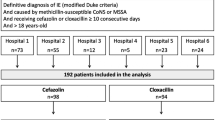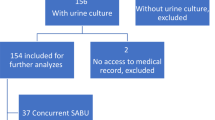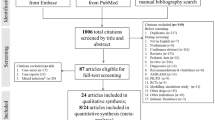Abstract
Purpose
The management of post-surgical subdural empyema and subdural abscess is not standardised. The objective was to analyse the efficacy and safety of oral sequential therapy (OST).
Methods
Retrospective observational study in a tertiary hospital in Vigo (Spain). We included adult patients with subdural abscess or epidural empyema with microbiological isolation. Clinical and demographic variables, isolated microorganisms and treatment regimens were included, as well as mortality and adverse effects during the follow-up period.
Results
Thirty patients were reviewed, two died due to causes other than infection. Six-month recurrence rate was 2/28 and all other patients (26/28) had clinical cure at the end of the treatment. The commonest isolated microorganisms were Gram-positive, especially Staphylococcus aureus. The most widely used oral antibiotic was trimethoprim–sulfamethoxazole (80%). No side effects related to oral treatment were observed.
Conclusion
After adequate source control, OST can be a safe practice in the management of post-surgical epidural abscess and subdural empyema.
Similar content being viewed by others
References
Martin RM, Zimmermann LL, Huynh M, Polage CR. Diagnostic approach to health care- and device-associated central nervous system infections. J Clin Microb. 2018;56:e00861-e918.
Owens CD, Stoessel K. Surgical site infections: epidemiology, microbiology and prevention. J Hosp Infect. 2008;70:3–10.
Patel S, Thompson D, Innocent S, Narbad V, Selway R, Barkas K. Risk factors for surgical site infections in neurosurgery. Ann R Coll Surg Engl. 2019;101:220–5.
Múñez E, Ramos A, Alvarez de Espejo T, Vaqué J, Sánchez-Payá J, Pastor V, et al. [Aetiology of surgical infections in patients undergoing craniotomy]. Neurocirugia (Astur). 2012;23:54–9.
Pradilla G, Ardila GP, Hsu W, Rigamonti D. Epidural abscesses of the CNS. Lancet Neurol. 2009;8:292–300.
Chow F. Brain and spinal epidural abscess. Continuum (Minneap Minn). 2018;24:1327–48.
Tunkel AR, Hasbun R, Bhimraj A, Byers K, Kaplan SL, Michael Scheld W, et al. Infectious diseases society of America’s clinical practice guidelines for healthcare-associated ventriculitis and meningitis. Clin Infect Dis. 2017;64(6):e34–65.
Renz N, Özdirik B, Finger T, Vajkoczy P, Trampuz A. Infections after cranial neurosurgery: prospective cohort of 103 episodes treated according to a standardized algorithm. World Neurosurg. 2018;116:e491–9.
Bowen AC, Carapetis JR, Currie BJ, Fowler V, Chambers HF, Tong SYC. Sulfamethoxazole-trimethoprim (cotrimoxazole) for skin and soft tissue infections including impetigo, cellulitis, and abscess. Open Forum Infect Dis. 2017;4:ofx232.
Chiang H-Y, Kamath AS, Pottinger JM, Greenlee JDW, Howard MA, Cavanaugh JE, et al. Risk factors and outcomes associated with surgical site infections after craniotomy or craniectomy. J Neurosurg. 2014;120:509–21.
Acknowledgements
None
Author information
Authors and Affiliations
Corresponding author
Ethics declarations
Conflict of interest
The authors declare that they have no conflict of interest.
Consent to participate
Regional Ethical Committee evaluated the study protocol and consent to participate was not required.
Rights and permissions
About this article
Cite this article
Rubiñán, P., Pérez-Rodríguez, M., Domínguez, A. et al. Oral sequential therapy in the treatment of post-surgical epidural abscess and subdural empyema. Infection 50, 1385–1389 (2022). https://doi.org/10.1007/s15010-022-01814-x
Received:
Accepted:
Published:
Issue Date:
DOI: https://doi.org/10.1007/s15010-022-01814-x




